You’re launching a new title, so you reach out to retailers to arrange book signings. That’s how books are launched, right?
Not so fast.
Traditionally, book events have featured one author and one book, usually a new release, with the author perhaps giving a talk at bookstores and libraries. Publishers may feature multiple authors and titles at fairs and festivals, but the costs of participating can be prohibitive for smaller presses.
Lately, book events have been evolving. As publishers embrace these new options, they’re also discovering new ways to generate revenue.
Outside the Box
Publishers, booksellers, and publicists were already experimenting with alternatives to the traditional book events when the COVID-19 pandemic struck, accelerating the rate of change.
“COVID-19 has certainly caused us to rethink and re-strategize our events,” says Stephen McArthur, co-publisher at Rootstock, a hybrid press. “Our authors are getting creative also.”
Recently, Rootstock author Bernie Lambek launched An Intent to Commit at a theater instead of a bookstore. Though COVID-19 restrictions created limited capacity, McArthur says guests filled every available seat, and almost everyone in the crowd bought a signed book.
Building on this success, Rootstock is expanding its visions for book events. “Bookstores and libraries will still be great venues, but we are branching out with other possible locations,” McArthur says, noting the possibilities with movie theaters, restaurants, cafes, and outdoor settings.
Ticketed events can be another draw. “Go where people meet socially and are in a great mood to buy books,” says Rebecca Rosenberg, author/publisher at Lion Heart Publishing. For her recently released novel Champagne Widows, Rosenberg set up events with the owners of a champagne bar and a winery. For $25, participants enjoyed champagne tastings while Rosenberg talked up her book.
“I love to get out in the community and talk about my real historical women,” she says. In addition to a slide show, her program includes trivia games about the book and themed prizes such as champagne bottles filled with champagne-flavored jelly bellies.
Soup kitchens and homeless shelters may not be great places to sell books, but author Frank McKinney books events there. Addressing these nontraditional audiences on self-arranged book tours, he shares inspiration from his self-help and mindset books such as Aspire! How to Create Your Own Reality and Alter Your DNA. At these events, he also holds giveaways and donates to the organizations running the facilities.
What’s the benefit to the author and publisher? “This type of unconventional book tour usually draws the interest of the local news, who send reporters and cameras to the events,” says McKinney’s publicist Leslie Barrett of PR by the Book. “It was all Frank's idea. He wanted to reach as many people as possible through media exposure.”
The logistics for McKinney’s events are much the same as setting up a traditional book tour, with the author reaching out to shelters instead of bookstores and inviting local media once the events are set up. From a publicist’s perspective, Barrett says, “It’s fun to work with an author who doesn’t mind pushing boundaries and thinking outside of the box.”
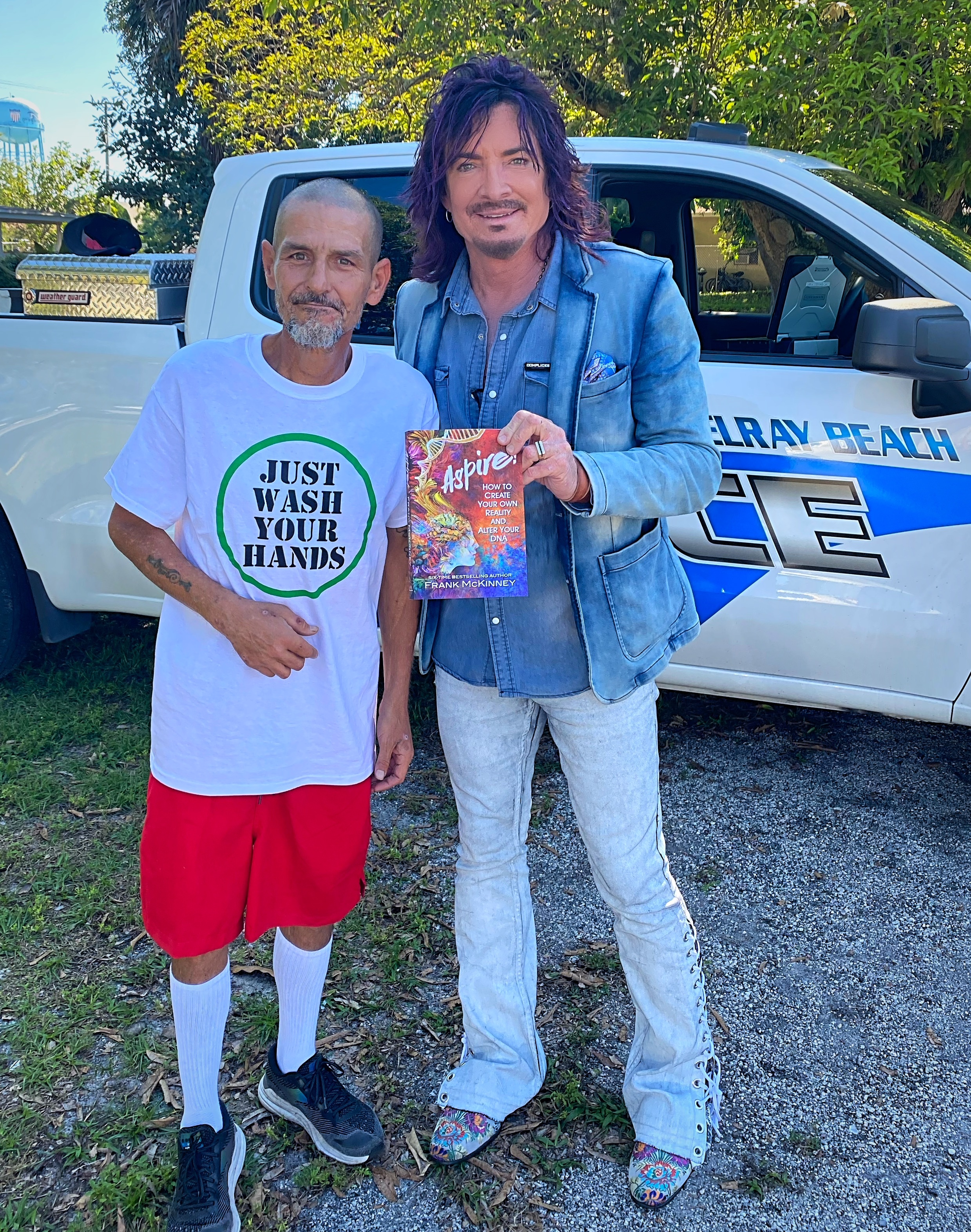
Author Frank McKinney (pictured right) books events at soup kitchens and homeless shelters.
The Reader Connection
For Susan McBeth, founder and owner of Adventures by the Book, events are all about connecting readers with authors in ways that are more meaningful than traditional book signings.
“Initially, I just wanted to offer an alternative to what I perceived as outdated and stale book- signing, lecture-style events,” she says. “Over time, it became clearer to me that people were really looking to connect, so we focused on creating events that offer opportunities for people to engage with the author and with one another.”
In planning book events, McBeth aims to be unique. “My motto is that if someone else is doing it, I don’t want to do the same thing. We have hosted everything from decadent literary teas to wine and book pairings to culturally themed dinners to book launch parties, corporate events, novel fundraisers, and even travels with authors.”
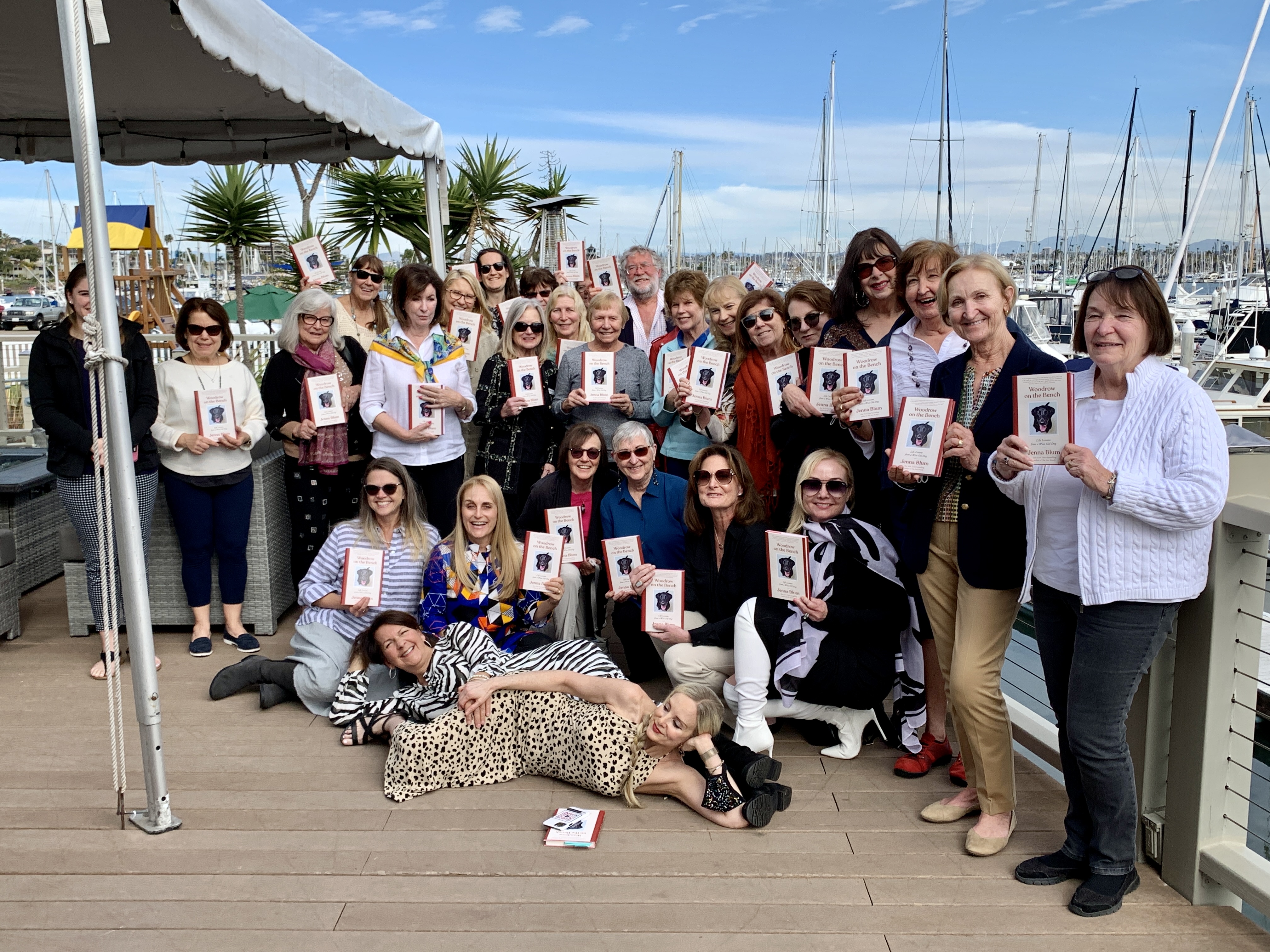
Adventures by the Book’s Southwestern Yacht Club Luncheon Adventure with New York Times bestselling author Jenna Blum.
As an example of one of the more upscale events on this year’s calendar, McBeth points to the eight-day Adventures by the Book Wellness Retreat. At a world-class spa in Tecate, Mexico, book lovers will enjoy “exclusive intimate events” with authors Kate Quinn and Jane Green.
The concept behind these unique events couldn’t be simpler. “Because our demographic is similar to me personally, I try to find events that are appealing to me,” McBeth says. “The goal is for everyone to walk away feeling like they’ve made a new friend, learned something, had a memorable experience, and want to come back for another adventure.”
McBeth’s primary concern isn’t moving inventory, but she understands that publishers and authors need to sell books, so that’s always “a strong factor” in how she structures events. “We know that when we connect and engage people, they walk away happy, which makes us happy,” she says. “But those same people will typically walk away with a book, too, which makes the author and publisher happy.”
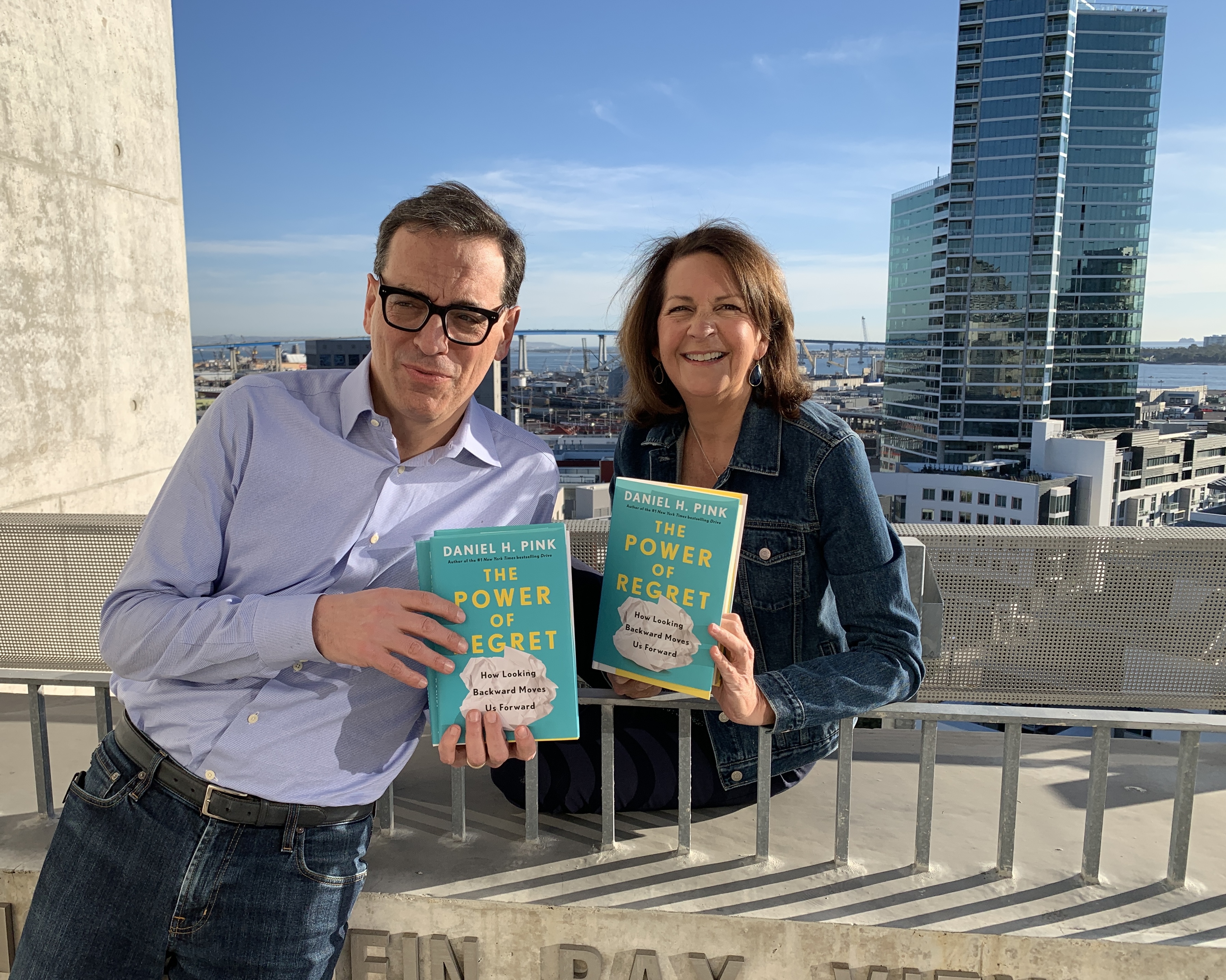
An event put on by Adventures by the Book with New York Times bestselling author Daniel Pink at the San Diego Central Library.
Bookstores: What’s Old Is New
Events are evolving at bookstores, too. At San Diego’s Mysterious Galaxy Bookstore, co-owner Matthew Berger notes a trend toward authors in conversation, which has also worked well with the virtual events necessitated by COVID-19 restrictions. “Some of our favorite nontraditional book events are author panels, which feature several authors talking about a specific theme,” he says.
Berger points out that readers never tire of learning what happens behind the scenes in a book’s creation, including the inner workings of an author’s mind. But these days, diversity matters, too. In setting up Mysterious Galaxy events, he says, “We’re always looking for exciting, new, diverse voices.”
For Berger, events are about more than numbers. “We don’t measure success just by the sheer number of attendees or books sold,” he says. “If there are five really passionate people at an event who are engaged with an author, that’s a success for us, because you want people to come away feeling excited to read. There’s something electric about events where you can just tell people are fully invested in the worlds authors build.”
For events at The Writer’s Block Bookstore in Anchorage, Alaska, necessity has been the mother of invention, with COVID-19 and geography being two defining factors.
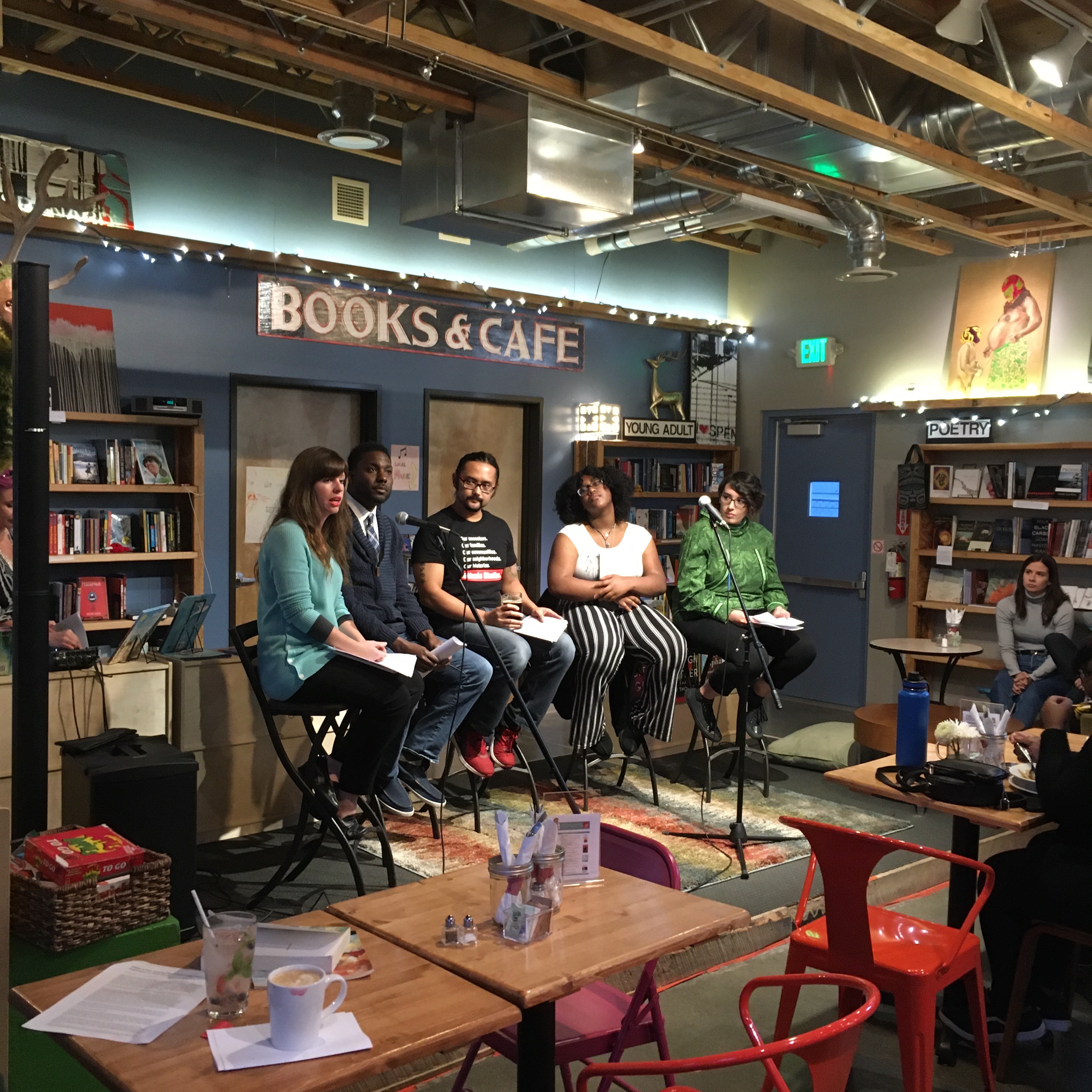
A group reading and conversation with poets/writers at the Writer’s Block Bookstore & Cafe in Anchorage, Alaska, in October 2019.
“We’re off the grid in terms of book tours, so we often focus on Alaska authors or folks with Alaska connections,” co-owner Teeka Ballas says. “We want people to show up and interact with the writer and each other, so we look for book events where there’s a clear connection between the writer and our community, or the book subject and groups in our community.”
Like Berger and McBeth, Ballas says engagement is the key to a successful event. “Did people ask questions? Were there side conversations? Did the writer share things off the cuff? For us, that’s the essential thing.”
Writer’s Block co-owner Dawnell Smith says that some of the store’s most memorable events have paired authors with other creatives, such as musicians or writers in a different genre. They’ve hosted a burlesque book reading, an author integrating his work with contemplative Americana folk music, and events with multiple writers who reflect on each other’s work.
During the pandemic, the store pivoted to “around the fire” events. One notable example was Alaska’s state writer laureate Heather Lende reading from Of Bears and Ballots outside during a winter COVID-19 surge. “People were bundled up by the heaters,” Ballas says. “That tells you something about connection.”
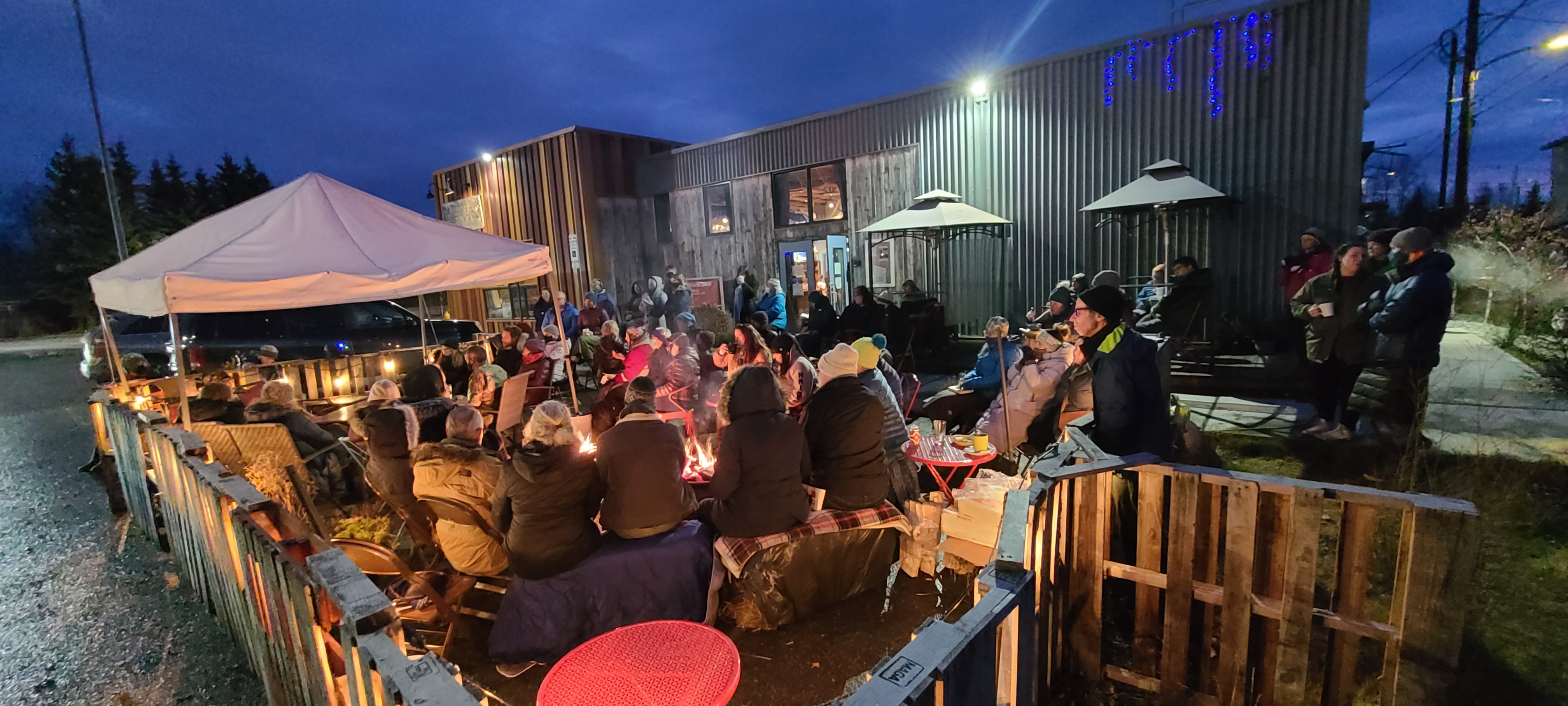
A fireside outdoor reading put on by the Writer’s Block Bookstore & Cafe for author Heather Lende in Anchorage, Alaska, in 2021.
Fairs and Festivals
Book fairs and festivals are nothing new, but innovations are happening in those spaces, too.
Last year, Fox Pointe Publishing began holding “pop-up publisher book fairs” at libraries and various retail outlets.
“Retailers like this idea because it allows them to see how well our books sell and which titles their customers are interested in before making inventory-ordering decisions,” co-publisher Kiersten Hall says. “Plus, they get to take advantage of the wholesale split while ringing the sales through their registers.”
To entice libraries into hosting the pop-up book fairs, Hall offers a quantity of gifted books based on sales totals. “To date, every pop-up publisher book fair has yielded Fox Pointe a new wholesale account,” she says. “Retailers and libraries witness how well the books are received by their customers and patrons. They get to see the quality of the books in person, and they realize how easy the ordering process is through us.”
A hybrid press, Fox Pointe has a large catalog, so they take their pop-up fairs on the road. Hall says one carload of books typically covers three events. If they have more events to cover, they ship in advance. “On average, gross sales for a three-hour event can range between $1,000 to $1,500,” Hall says. The new wholesale accounts generate additional sales, plus the fairs get Fox Point books in front of new readers, including other retailers.
No wonder Fox Pointe is adding more of these “extremely successful” events to their calendar. “Retailers and librarians appreciate the unique opportunity to have these events in their place of business, and they also appreciate the personalized service to them and their customers and patrons,” Hall says.
For smaller publishers, the cost of a booth at a traditional book fair or festival can be prohibitive, which is why IBPA offers members discounted exhibit opportunities at the American Library Association annual conference and the Frankfort Book Fair. To bring that model to more regional events, author/publisher Guy Morris recently created the Author Event Network.
After success with an informal booth-sharing model in the Seattle area last year, Morris formed a legal entity to carry the concept forward, with plans to take area authors to six to eight major events in 2022. He says a mid-Atlantic chapter is forming, and he hopes to target other regional markets in the future.
Virtual Success
The pandemic was an unexpected development in the evolution of book events, forcing everything online for a time. But the virtual format has also expanded possibilities going forward.
“Not only are virtual tours possible and many times super successful, they’ve made it possible to do great conversation pairings you wouldn't otherwise see,” Berger says. He notes that even the negative of occasional Zoom bombing and harassment of BIPOC and LGBTQIA+ authors was turned to a positive as organizers focused on protecting authors in welcoming online spaces.
As COVID-19 restrictions lift, Mysterious Galaxy is exploring hybrid events, growing the audience for in-person author talks with real-time virtual broadcasts. “This [model] expands the number of people who can attend and allows for people to watch later,” Berger says. “It can also be a great way to make events more accessible for those who might not otherwise be included, like immunocompromised or disabled communities.”
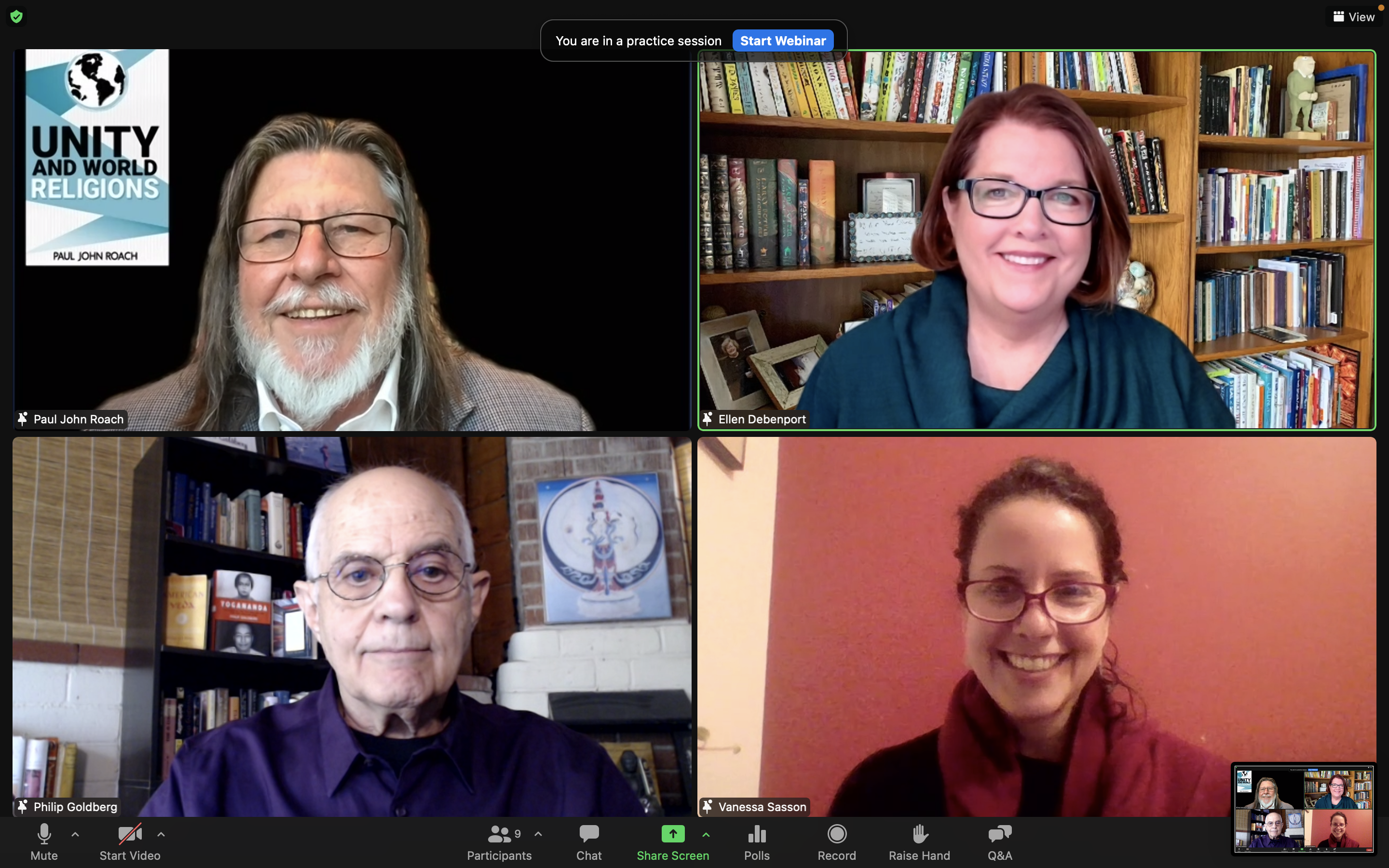
A screenshot of a Unity Books Presents online conversation with author of Unity and World Religions, Paul John Roach (pictured top left). Unity Books invited a couple of panelists to talk about world religions with him.
The pivot to online events can expand a publisher’s reach far beyond in-person events. At Unity Books, vice president of publishing Ellen Debenport notes the success of a live online event featuring author Jan Phillips’ book Still on Fire: Field Notes from a Queer Mystic. “One hundred sixty-five people attended the event live, and others watched the recording later,” she says. “Many were new to our database, and now we can follow up with them on other events and products.”
The model worked so well for reaching Unity’s global audience that the company has now established Unity Books Presents as an ongoing series for launching new books and drawing attention to its backlist.
The Future of Book Events
Changes in the book event space mirror changes in publishing overall. “We have to adapt to the constantly evolving media platforms and surprise people with creativity and ingenuity,” Barrett says.
Still, McBeth continues to be surprised that the evolution isn’t happening more quickly. “When I first founded Adventures by the Book, everybody told me that nobody was doing what we were doing,” she says. “Eleven years later, we still hear that on a regular basis.”
She thinks COVID-19 restrictions may have been a much-needed wakeup call. “Finally the industry may take a good, hard look at what is working and what isn’t,” she says. “I suspect many traditional author tours and bookstore events may come to an end or at least morph into something more fruitful.”
Whatever the specifics of how book events continue to evolve, Smith says it all comes back to satisfying the core need for connection. “A book is trying to say something, and people who read it have a response. That’s the magic.”
Whether enhanced with more interactive opportunities, unique venues, innovative models, or virtual integrations, book events will continue to facilitate that magic, providing memorable experiences that get books into the hands of more readers.
Deb Vanasse is the author of several traditionally published books, her most recent being Roar of the Sea. In addition to her work as a freelance editor, she self-publishes as Vanessa Lind.